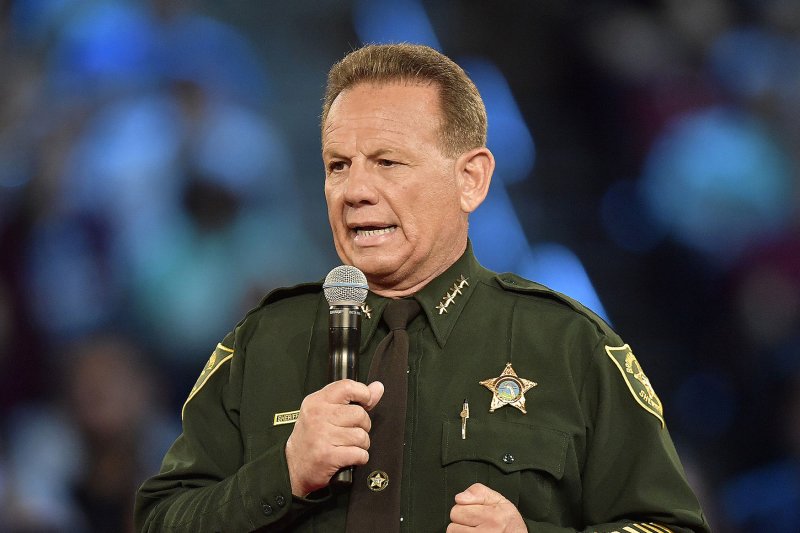Broward County Sheriff's Office plans to change language in a policy instituted by Sheriff Scott Israel to indicate that a deputy "shall" intervene in an active shooting rather than "may." Pool Photo by Michael Laughlin/UPI |
License Photo
Dec. 26 (UPI) -- Florida's Broward County Sheriff's Office plans to change its policy on how deputies respond to active shooters in response to the Feb. 14 shooting at Marjory Stoneman Douglas High School.
The policy changes include altering language in what is expected of deputies in active shooting situations to indicate they "shall" attempt to enter the scene and intervene rather than "may," according to an internal memo by Sheriff Scott Israel to Pinellas County Sheriff Bob Gualtieri, who is the chair of the Marjory Stoneman Douglas High School Public Safety Commission. The letter was obtained by the Miami Herald.
"The use of the word 'may' in the BSO policy is ambiguous and does not unequivocally convey the expectation that deputies are expected to immediately enter an active assailant scene where gunfire is active and neutralize the threat," the commission wrote in a draft report of its conclusions released earlier in December.
Under the new policy, which goes into effect Jan. 4, deputies responding to an active shooting "shall attempt to protect the life of innocent persons through immediate tactical intervention to eliminate the threat."
The previous policy stated "if real time intelligence exists the sole deputy or a team of deputies may enter the area and/or structure to preserve life. A supervisor's approval or on-site observation is not required for this decision."
Israel told the commission in November he personally included the word "may" in the old policy to prevent deputies from entering situations that would result in certain death and allow them to "think on their feet."
"I want an effective tactical response, not a suicide response," he said. "The goal of any agency's response is to save lives. 'May' allows a deputy discretion."
Israel was however critical of former armed deputy and school resource officer Scot Peterson, who resigned after receiving criticism for not entering the building at the Parkland, Fla., high school as former student Nikolas Cruz shot and killed 17 students and faculty members.
In a press conference detailing Peterson's actions during the shooting, Israel said the deputy should have gone in, "addressed the killer. Killed the killer."
Additionally, the policy provides an updated list of priorities for deputies responding to an active shooting.
"Deputies responding to active threat(s) incidents shall attempt to protect the life of innocent persons through immediate tactical intervention to eliminate the threat. In such scenarios, the prioritization of activities in order of importance will be: 1. Stop the active assailant(s); 2. Rescue the victims; 3. Provide medical assistance; 4. Arrest suspects and preserve the crime scene," the letter states.
The policy also includes an exception to the rule that officers "shall" immediately seek to intervene in a shooting.
"While deputies are expected to tactically intervene, there may be very limited extenuating circumstances when entry by a solo deputy must be delayed until the situation changes, or additional deputies or resources are present," it states.
Ryan Petty, a commissioner on the safety panel and the father of Alaina Petty, 14, who died in the MSD shooting, said the policy appeared "significantly improved" but told NBC News it should have been in place prior to Feb. 14.
"Make no mistake, this is a 180 degree change in policy for BSO," Petty said. "It is clear and concise with few exceptions, so effective training can be developed to address future active assailants."
He added, Israel's response didn't take on enough responsibility for personally including the language in the previous policy.
"It's an admission of responsibility without coming out and saying, 'I made a mistake,' and leaders admit mistakes," Petty said.















